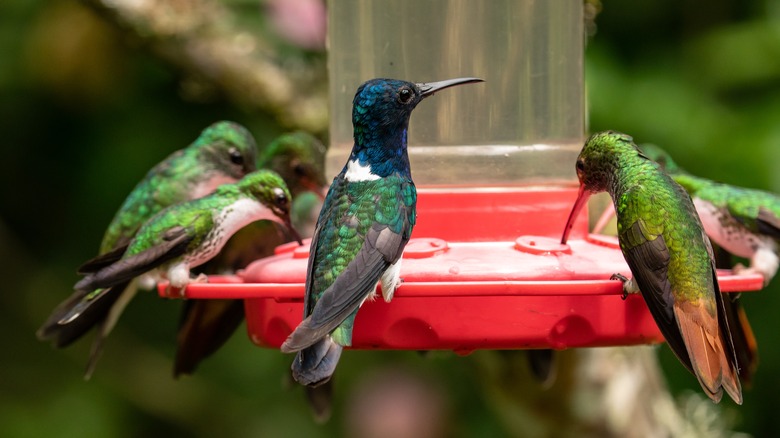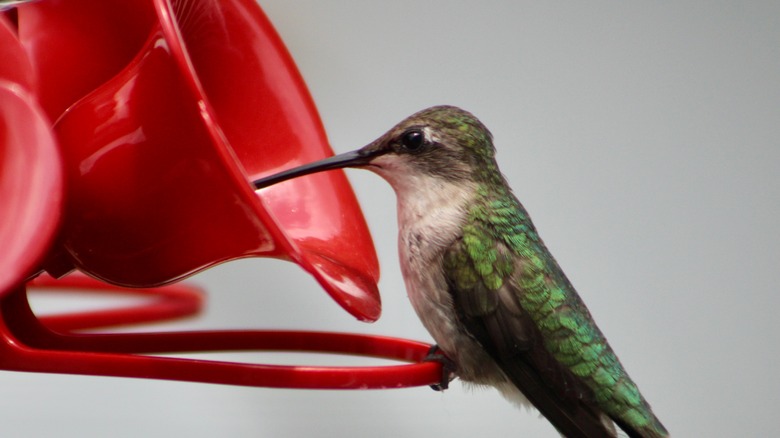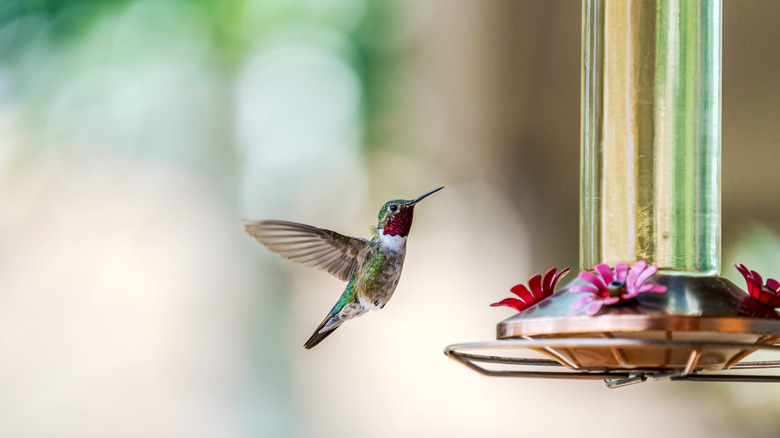Should You Clean Your Hummingbird Feeder With Vinegar? Our Bird Expert Weighs In
Hummingbirds are a welcome visitor in our backyards and gardens. In fact, many of us try to attract these little birds by adding color or by creating a calm, inviting environment. One of the ways we can create a place that hummingbirds seek out is by adding a bird feeder. Hummingbirds have a very speedy metabolism, causing them to have to stop and feed themselves often throughout the day. And while, the majority of the time, hummingbirds are keen at seeking out nectar from native plants and spotting small insects themselves, adding a feeder can help make things a bit easier for the birds — as long as the feeder is cleaned with the right cleaning agents. According to Zach Hutchinson, the Head Flocker at Flocking Around, who spoke exclusively with House Digest, that does not include vinegar.
If you want to incorporate a feeder into your garden, make sure you are including nectar that is safe for hummingbirds to eat. Homemade hummingbird nectar is actually quite easy to make, but that homemade nectar is only going to keep the birds healthy and coming back if the feeder is properly cleaned.
Why you should avoid vinegar when cleaning your hummingbird feeder
While vinegar is a great cleaning agent for many household items, using it can be an error for your hummingbird feeder. "Vinegar is generally not recommended for cleaning hummingbird feeders as it creates an unnecessary hazard for our speedy visitors," says Zach Hutchinson, speaking exclusively with House Digest. "The vinegar, if not rinsed thoroughly and properly, might find its way into the nectar and be accidentally consumed by the feeding hummingbirds."
If your feeder has gone past the point of simply rinsing and cleaning lightly, Hutchinson says that vinegar can be used, but only in certain situations. "If a particular feeder is overrun with mold, vinegar may be a necessary cleaning agent," he explains. "If you MUST use vinegar, dilute it before soaking and rinse your feeder SEVERAL times."
In addition to avoiding vinegar where possible, you'll also want to ensure that you're filling your feeder with the correct mixture of sugar water. "Remember, making sugar water is always the safest choice for feeding hummingbirds," Hutchinson advises. "Combine 1 part sugar with 4 parts water and stir until the sugar fully dissolves. Boiling is not necessary for creating this nectar imitation. Use only refined, white cane sugar; do not use organic sugars (these can be dangerous)." He also recommends avoiding additives. "No food coloring, extracts, or electrolytes are needed, helpful, or completely safe."
How to properly clean your hummingbird feeder
With vinegar out of the realm of possibilities, you are likely wondering how, exactly, to keep your hummingbird feeder clean and safe for your favorite little friends. "Usually, dish soap and hot water are sufficient for cleaning hummingbird feeders," Zach Hutchinson tells House Digest exclusively. "Additionally, running them through a dishwasher can be useful for feeders that are dishwasher safe. If you use a dishwasher, make sure to sanitize your washer BEFORE and AFTER running the feeders through the system."
But, according to Hutchinson, the best way to clean your feeder is to stay on top of maintaining it regularly. "Diligent hummingbird lovers who change their nectar every three to four days will be able to clean their feeders with a simple combination of soap and hot water. Using bottle brushes can help clean the nooks and crannies that are otherwise impossible to fully reach." He emphasizes that if you keep on top of your cleaning schedule, you shouldn't need to resort to using vinegar.


